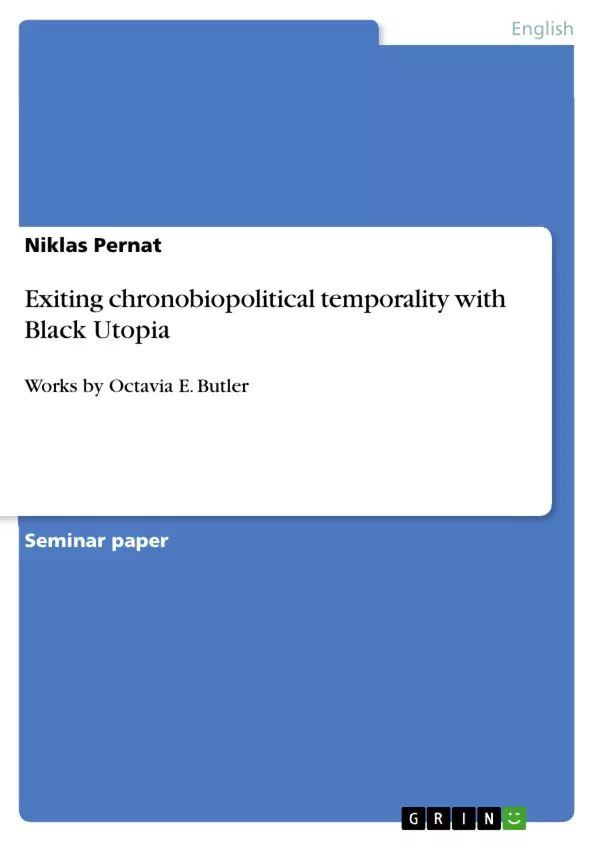Based on Michel Foucault's concept of biopolitics, chronobiopolitics begins at the moment when it's impossible to distinguish between a political and a private, non-political life anymore, where subjects are set up in a chronological concept of progress or sometimes called civilization. Chronobiopolitics is creating a notion of time, a temporality, which is reproduced by its cultural aspects. By doing this, other cultures are going to be marginalized or eliminated and left with an interrupted cultural history. In the case of the African diaspora, a very dark history, better-called trauma, which ghosts are still haunting in our present social reality.
This essay will explore what it means for those people to live in a chronobiopolitical temporality and what kind of ghosts are haunting the diaspora. In addition to this, this essay aims to present a theoretical concept of thinking, which can free politics from the western narrative of temporality and governance. Different Ideas of “Black Utopia” can be found in music, literature, and many other forms of art. Two novels from the Afrofuturistic writer Octavia E. Butler will show us how black science fiction will deal with the ghosts of the past and how we can create new concepts of time. The idea is to replace the constitutive methods of thinking in political discourses with new constructive alternatives derived from the fiction of artists, which includes a transcendence concept of culture and people.
In a final step, this essay will underline the potential of those ideas, which can lead to a reflexive praxis in contrast to an apocalyptical disaster, which is intensively proclaimed since the Cold War. Black Utopia functions here as complete opposition to radical, violent revolts against western repression. While left youth protests, such as the punk movement in the eighties, proclaiming a dystopian future, these theories offer much more positive exits of the chronobiopolitical temporality, which will be concretized in the conclusion.
Inhaltsverzeichnis (Table of Contents)
- Abstract
- 1 What are Chronobiopolitics?
- 1.1 Chronobiopolitical temporality and the African diaspora.
- 1.2 Hauntology as an effect of eliminating history
- 2 The work of Octavia E. Butler
- 2.1 Kindred
- 2.2 The Parable of the Sower.
- 3 Exiting chronobiopolitics with Afrofuturism
- Works cited
Zielsetzung und Themenschwerpunkte (Objectives and Key Themes)
This essay explores the concept of chronobiopolitics, a term derived from Michel Foucault's biopolitics, and its implications for the African diaspora. It examines how chronobiopolitics perpetuates a western narrative of time and progress, leading to the marginalization and exclusion of other cultures. The essay aims to present a theoretical framework for liberation from this oppressive temporality by drawing on Afrofuturistic ideas, particularly those found in the works of Octavia E. Butler.
- Chronobiopolitics and its impact on the African diaspora
- The concept of hauntology and the erasure of history
- Afrofuturism as a counter-narrative to chronobiopolitical temporality
- The role of Octavia E. Butler's novels in challenging dominant notions of time
- The potential for Black Utopia as a model for a more just and equitable future
Zusammenfassung der Kapitel (Chapter Summaries)
The first chapter of this essay defines chronobiopolitics and its impact on the African diaspora, arguing that it forces a forced adjustment to dominant chronobiopolitics, causing alienation and cultural erasure. The chapter also explores the concept of hauntology, highlighting the lingering effects of colonial trauma and the silencing of histories that do not conform to Western narratives of time. The second chapter focuses on the work of Octavia E. Butler, specifically analyzing her novels "Kindred" and "The Parable of the Sower." These novels are examined as examples of how Afrofuturism can challenge the dominant chronobiopolitical narrative by imagining alternative futures and reclaiming agency over time.
Schlüsselwörter (Keywords)
This essay revolves around the key concepts of chronobiopolitics, the African diaspora, hauntology, Afrofuturism, and the works of Octavia E. Butler. These themes intertwine to explore the potential for Black Utopia as a counter-narrative to Western temporality and a pathway towards a more equitable and just future.
Frequently Asked Questions
What is "chronobiopolitics"?
Derived from Foucault, it is a concept where political power dictates a specific chronological notion of time and progress, often marginalizing non-Western cultures.
How does chronobiopolitics affect the African diaspora?
It creates an interrupted cultural history and a forced adjustment to Western narratives, leaving the diaspora to deal with historical traumas or "ghosts."
What is "hauntology" in this context?
Hauntology refers to the lingering effects of an eliminated or silenced history, where the "ghosts" of colonial trauma continue to haunt the present social reality.
How does Octavia E. Butler use Afrofuturism?
In novels like "Kindred," she uses science fiction to confront the ghosts of the past and imagine alternative concepts of time and agency for Black people.
What is "Black Utopia"?
It is a theoretical framework and artistic expression that offers a positive exit from oppressive Western temporalities, focusing on transcendence and constructive alternatives.
- Citation du texte
- Niklas Pernat (Auteur), 2021, Exiting chronobiopolitical temporality with Black Utopia, Munich, GRIN Verlag, https://www.grin.com/document/1147866



